Israel at war: What happened on day 51?
11 Israeli hostages - nine children and two mothers- have returned to Israel and are being seen at Ichilov Hospital.
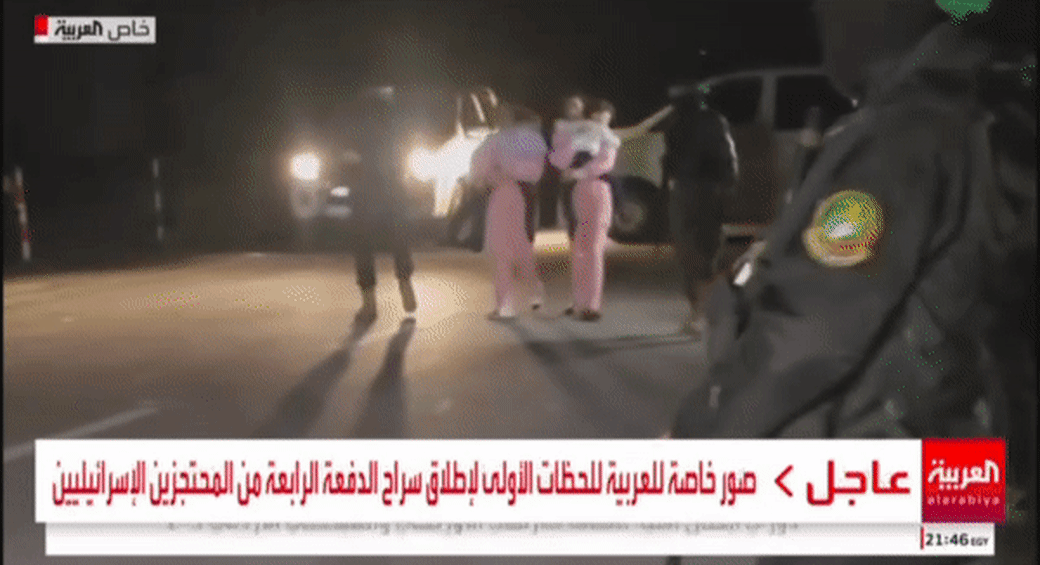
Hamas's spokesman for east Jerusalem affairs, based in Gaza, eliminated

Muhammad Hamada, Hamas's spokesman for east Jerusalem affairs, was eliminated by IDF forces in Gaza, the terrorist group confirmed Monday.
Go to the full article >>Gazan who escaped to Israel, converted to Judaism shares his story
The amazing story of the Gazan who escaped to Israel and converted to Judaism.

"In Gaza, there are no citizens who oppose Hamas. If necessary, they will murder Jews, Christians, and even Muslims," Dor Shachar, 46, said in an interview with Maariv. Born in Khan Yunis, in the Gaza Strip, as Ayman Abu Suboh, who escaped to Israel, converted, and now lives in Rishon LeZion.
According to Shachar, "In Gaza, they are affiliated with organizations like Hamas, Islamic Jihad, Fatah, Popular Front for the Liberation of Palestine [PFLP], and others. All these organizations support the killing of Jews. Some of these organizations have infiltrated the Gaza Strip. This is a religious war; they want to take over the entire world."
As a child, Shachar learned that Jews were murderers who took his ancestors' land and that he needed to fight them. "I remember once, Israeli soldiers joined us for a soccer game in the neighborhood. I was maybe 6 years old," he recalled. "After the game, a soldier called me, placed something in my hand, and closed it for me.
"After a few seconds, I opened my hand and saw a candy. I opened it and it was tasty. I took the wrapper home and showed it to my father because I wanted him to buy me such candies. My father asked me where I got this wrapper, and I told him I got it from the Jews, from the soldiers. He got up, and in his anger, he warned me not to take anything from them next time because the soldiers could poison it."
Education in Gaza was focused on martyrdom, not life skills
At the age of 7, Shachar recalled having a new teacher at school who said that there would be a special lesson that day. Shachar was happy because he thought the teacher would teach them to become doctors. However, the teacher started talking and said that Jews were murderers of children, men, women, and the elderly. He said, "The Jews took your grandfather's land, and you will fight for it, and whoever dies will be a martyr and go to paradise. He also said that Jews had three legs."
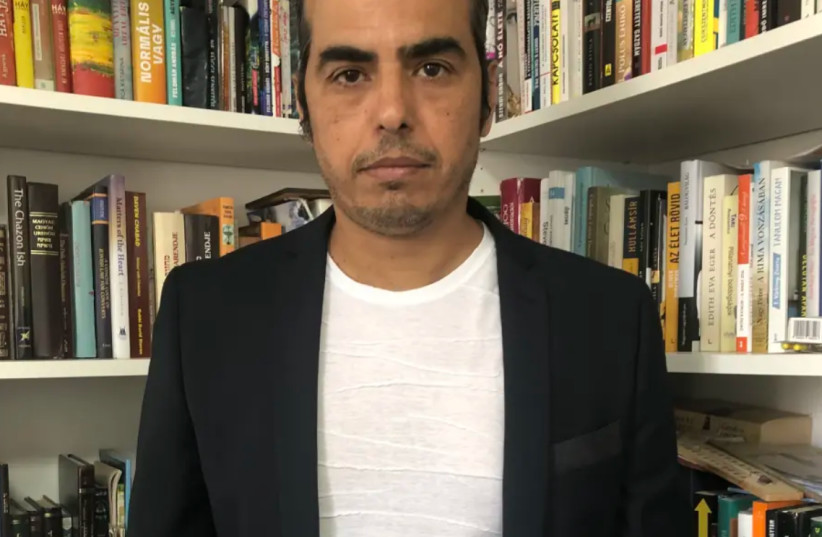
It was unsettling to receive such indoctrination at such a young age, especially from an authoritative figure.
"Exactly. At that moment, I didn't feel good. My happiness turned into a nightmare, and I told the teacher that I didn't feel well. He slapped me on the cheek and took me to the principal's office. The principal asked me to stand facing the wall and gave me a slap with a rubber hose, and it burned. He demanded that my father come to school with me. The next day, my father came with me to school and went into the principal's office. He scolded me and told me that I needed to kill Jews."
Is it possible that your father was influenced by the ideology of the PFLP, which was active during that period, or did he genuinely believe in what he was taught? Did your father ever change his views?
"My father worked in Israel for 27 years, and even with all that time in Israel, at home, he advocated for the murder of Jews. Even in the schoolbooks, it was written that we should behave this way because Jews took the land from the Palestinians. When I got home, I saw that my father had hung a rope from the ceiling and threatened to hang me. He also lit a gas stove there and threatened to burn me. My mother was not allowed to intervene."
Despite his father's threats, Shachar did not align with his father's demands. "It's like the story of our forefather Abraham. In hindsight, it's like [the biblical instruction of God to Abraham] 'Lech Lecha' – 'Go forth from your native land and your father’s house to the land that I will show you.' I feel like a messenger of the Jewish people. My mission is to warn Jews of dangers. We are all messengers in this world."
The return to Gaza
At the age of 11, Shachar was exposed to Israelis when he boarded a bus to Israel without his parents' knowledge. "I was curious to see those Jews with three legs. I arrived at 6:30 in the morning and saw a couple walking in Rishon LeZion. They passed by me, and I looked closely, searching for their third leg," he recounted. "Towards evening, I returned home and saw my father. It was strange because he was supposed to come back on Thursday. He asked me where I had been, and I told him, with the sheep.
"He told me, 'Don't lie!' But he didn't punish me; he just told me to go to sleep. He knew I had been in Israel because the people on the bus, those who recognized him, told him. The next day, he took me with him to the construction site where he worked. He allowed me to prepare concrete and carry it in buckets over a long distance. It was very heavy, but it didn't matter to him."
When Shachar was 12, his father took him to work with him in construction. When he was 13, he ran away from home and didn't return to the Gaza Strip until the age of 19 and a half. He found a job as a security guard at a construction project in Rishon LeZion, where he met Nissim, who would later become his adoptive father. Shachar has another adoptive family, Gur, and Amira Tzabar, and he is in touch with both families.
About Nissim, he said, "He is an angel. For me, he is my father. People like him cannot be found. That's why I said we are all messengers, and as far as I'm concerned, God sent me an angel. Later, he and his wife taught me to read and write Hebrew; they taught me to love."
Afterward, Nissim invited him to celebrate the Passover Seder with him and his family, and then Shachar decided to become Jewish. "I told him I wanted to be Jewish. He said, 'Wait, what did you say?' and I repeated the words. He was surprised by what came out of my mouth. He told me that whoever is Jewish remains Jewish, whoever is Muslim remains Muslim, and whoever is Christian remains Christian, but I didn't accept that.
“Nissim understood my intentions and set up a meeting with the rabbinate for me. The rabbi agreed to convert me but demanded a special letter from the family because I was a minor. I explained to him that I had no contact with my family, and if I asked them for such a letter, they would kill me. He advised me to wait until I turned 18. I was disappointed. A year later, at the age of 17, a Palestinian murdered a girl named Helena Rapp in Bat Yam [in 1992], shocking the entire country. The government decided to expel all the Arabs so that there would be no revenge. Every time I saw the police, I would run away. After three or four months, the government decided to bring in workers over the age of 40, which meant that I became an illegal worker."
"At the age of 18, I went to a rabbi at the rabbinate and told him I was 18 and asked him to convert me. He said that because of the security situation, I needed special permission from the state to stay. I returned to live at the construction site. One day, a police patrol stopped me there, and they arrested me. I ran away naked because I was in the middle of taking a shower. When they asked me why I ran away, I told them I was scared.
"I told them I wanted to be Jewish. They took me back to the construction site and told me to stay there. They gave me their phone number and told me that if I saw illegal Arabs, I should report them, and I agreed. They emphasized that if another officer arrived, I should tell them I was from Kafr Qasim because they were allowed [since this municipality isn’t in Judea and Samaria, but rather within the Green Line].”
But then the plans got messed up, as Shachar tells it. "At the age of 19 and a half, I injured my leg at the construction site, and they took me to the hospital. I had no insurance, and the police investigated where I was from. The hospital demanded a high amount for the treatment, and I asked the contractor who employed me to pay at least part of the amount, and in the end, he agreed. He asked for my address, and after 40 seconds, he called me and said he would come downstairs to pick up the money. I went down, and about four or five policemen wanted to approach me and stopped me. I told them I was from Kafr Qasim. Nevertheless, they took me to a four-hour interrogation, and I asked them to contact my handling officers, and they said they didn't know me at all. They took me to court, and there I said I wanted to convert and that I had been in the country for seven years. The judge sentenced me to 45 days in prison and an additional conditional sentence of ten months for three years. There were Palestinian Arabs in court who were waiting for a trial, and they heard everything I said and knew exactly what they were going to do to me. They took me to the prison in Beersheba, to the wing of Arab prisoners with blood on their hands, real people, and they beat me up. Then the inmates put me in the Jewish cell.
"After 45 days, they deported me to the Erez Crossing. They placed me in a small cell, and I remember that all the time, a man with murder in his eyes came into the cell. Afterward, they took me for questioning in the Gaza Strip and asked what I had done in the seven years in the country, and I told them I had been a guard. They hung me upside down, cut me, kicked me, sprayed hot and cold water on me, and then put me down again and asked what I had done.”
This went on for half a year. “Finally, they took me to a family in Khan Yunis. I wandered around Khan Yunis for a whole month, hungry and in the same clothes. I entered houses and stole food: bread, onions, tomatoes, whatever there was. I worked in Gaza, saved some money, and ran away from there again. I went to Egypt, from Egypt to Turkey, and from there, I arrived in Israel with a Palestinian Authority passport. The police caught me and took me back to the Erez Crossing. Fortunately, the policemen took me down a bit before the crossing, so I escaped, took a taxi, and returned to Rishon LeZion. It was a miracle for me," he said.
Asked about starting all over again in the same place, Shachar answered that this time it was different. “I started working as a security guard in Rishon LeZion, in a shopping center. After two months, there was a break-in at the warehouses where I worked, and I reported the break-in. The police commended me and wanted me to testify. The investigator praised me and said I was a good citizen, but she also said that I was detained and handcuffed. The next day they took me to court. The judge asked me to speak, so I stood up, spoke, and cried. She listened to me; I told her everything, from my childhood until that day. She released me on the bail of my adoptive father."
After seven years, he received approval to study Judaism and convert, and he studied at a Yeshiva. “After ten months, they sent me for an examination, and I couldn't answer everything. The rabbi said I should go to the Machon Meir Yeshiva [to study more before converting], so I packed my bag and went there immediately. I studied with Rabbi Oury Cherki, and after a few months, I underwent the final conversion process and succeeded.”
He received an Israeli ID number and card. “I also received a draft request in the mail and my IDF profile was 97 [the highest level of medical qualification in the IDF pre-enlistment exams], and I was destined for the paratroopers. During that time, I gave an interview to an Israeli newspaper, and they asked me what I would do if I were ordered as a soldier to evacuate settlers. I said I would refuse because I only wanted to protect the country's borders. Following this, they decided not to draft me."
Asked about the Hebrew name he chose to adopt, "Dor [meaning generation in Hebrew] represents peace and goodness, and Shachar means morning.”
Shachar, who has also written a book about his life, "From Khan Yunis to Mount Sinai," and lectures about it, was not surprised by the level of cruelty that Hamas militants reached on October 7. "When I was a child and went to the market with my mother, I saw that they beheaded those who claimed to have collaborated with Israelis. They cut off their heads and hands, and hung them on electricity poles, dragging them on the road while they were attached to cars. I was not surprised at all," he said, adding that there aren't many peace-loving people in Gaza. "Most of them no longer live there but emigrated to other countries.”
Shachar shared that he remembers that his grandfather used to tell him when he was a child that when he grew up, “I would have to kill Jews and reclaim Jaffa because it is our inheritance. It's a matter of generations being raised like this."
Regarding his biological family, Shachar explained that “if something happened to them, it wouldn’t bother me. My family is here in Israel. They taught me to love instead of hate, taught me to enjoy life and not die, and to become a suicide bomber.” Of the Palestinians, Shachar said “They used to throw stones [at Israelis] during my childhood, then came the Oslo Accords because Israel wanted peace with the Palestinians. The weapons they [the Palestinians] received were turned against Israelis. We disengaged from the Gaza Strip and in return have been suffering from missiles ever since."
Asked if he is optimistic about the future of Israeli-Palestinian relations, Shachar immediately answered “No. As a child, I saw a lot of violence, and difficult scenes that are hard to describe. If this is how they treated their people, you can understand exactly how they did and will treat Jews.”
Go to the full article >>Hamas taking advantage of ceasefire to move hostages - report

While Monday's hostage release continues to be delayed, Hamas is said to be using the ongoing ceasefire as an opportunity to move hostages it is holding in captivity to different locations, CNN reported on Monday.
This is a developing story.
Gaza ceasefire extension is close, Egyptian security sources say
Negotiations over the extension of the ceasefire in the Gaza Strip between Israel and Hamas are close to being finalized, Egyptian security sources said on Monday.
Go to the full article >>Elon Musk visits Israel, tours October 7 horror sites with Netanyahu
Prime Minister Benjamin Netanyahu is also due to meet Musk on Monday to discuss the security aspects of artificial intelligence and hold a live online discussion, Netanyahu's office said.
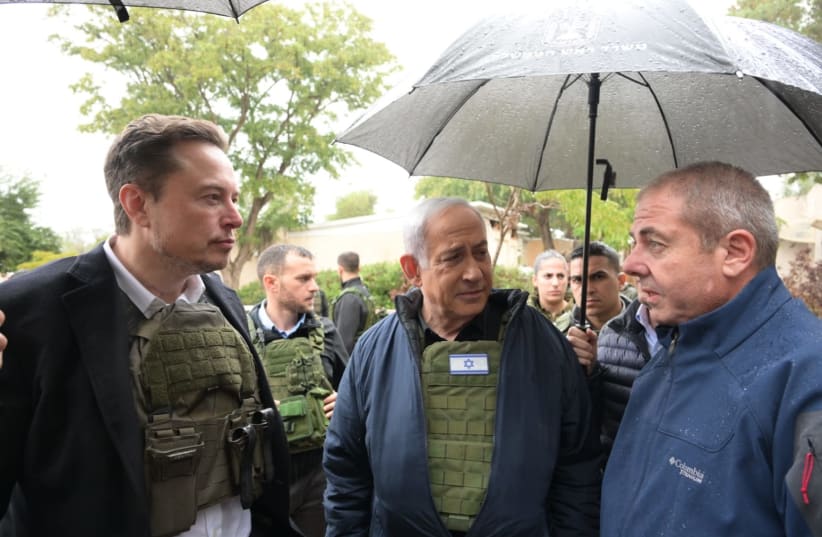
Israel hosted Elon Musk on Monday, where he toured sites of the October 7 massacre and was shown footage of the violent acts committed by the terrorist organization on Israeli soil.
Netanyahu and Musk later held a live chat on X, which can be listened to in full below.
— Benjamin Netanyahu - בנימין נתניהו (@netanyahu) November 27, 2023
Musk visited Kibbutz Kfar Aza early Monday, where he was shown a presentation of the terror attack and listened to the head of the Negev Council, Yossi Keren, and a member of the IDF Spokesperson's unit, Liad Diamond.
Israel hosted Elon Musk on Monday, where he toured sites of the October 7 massacre and was shown footage of the violent acts committed by the terrorist organization on Israeli soil. More details: https://t.co/jqlInndUb0 pic.twitter.com/RebuXXdR6E
— The Jerusalem Post (@Jerusalem_Post) November 27, 2023
Prime Minister Netanyahu and Elon Musk also went to the home of the Liebstein family, where Musk heard the story of the heroic acts of the late Ofir Liebstein, the head of the council who was murdered on the morning of October 7 in an exchange of fire with terrorists who infiltrated the kibbutz.
Go to the full article >>NATO's Stoltenberg calls for an extension of the humanitarian pause in Gaza
NATO's Secretary-General Jens Stoltenberg called on Monday for an extension of the four-day truce between Israel and Hamas, now in its final day, to allow for the release of more hostages.
Speaking to reporters, he also said Iran should rein in its "proxies." Hamas is part of a regional alliance comprising Iran, Syria and the Shi'ite Islamist group Hezbollah in Lebanon, which all broadly oppose US policy in the Middle East and Israel.
Go to the full article >>IDF's elite forces break down the siege of Gaza's Shifa Hospital
Shaldag decided purposely to enter the Shifa complex by blowing through a wall to catch any potential Hamas terrorists more by surprise.
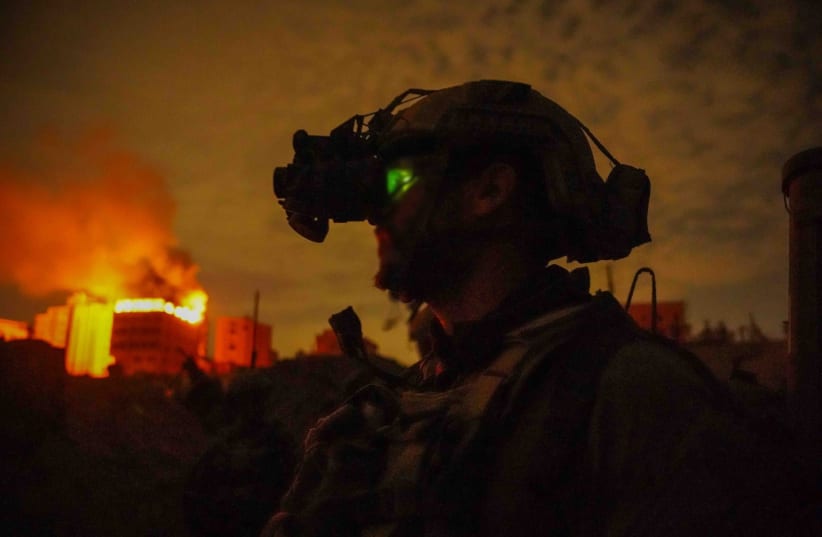
The IDF's Shaldag special forces, led by Lt. Col. "B", were crucial in retaking Israel's South on October 7, but will probably be most remembered in history for their role in taking control of possibly Hamas's most crucial asset, Shifa Hospital.
On Monday, B described Shaldag's strategy and operations for taking over Shifa second by second to a small closed briefing of military reporters.
He noted that Shaldag decided purposely to enter the Shifa complex by blowing through a wall to catch any potential Hamas terrorists more by surprise.
Verbally and watching real-time video, Shaldag forces could be seen moving from room to room and facility to facility finding Hamas military items.
Often, specially trained Oketz dogs went ahead first to locate potential boobytraps or potential Hamas terrorists waiting in ambush.
After checking floor -2 and the other floors of the Qatari and other facilities, Shaldag, Oketz, Yahalom, and others started to locate and penetrate Hamas's vast underground tunnel network around Shifa.
Go to the full article >>Qatar, Egypt, US, EU all working on Israel-Hamas ceasefire extension - PA
Qatar, Egypt, the United States, the European Union and Spain are working to extend the temporary ceasefire between Israel and Hamas in the Gaza Strip, the Palestinian Authority's foreign minister said on Monday.
After calling for a lasting ceasefire to avoid an increase in civilian deaths, Riyad Al-Maliki said the current truce could be extended for "one, two, three days" but added that no one knew for how long.
Al-Maliki was addressing a news conference alongside Spanish Foreign Minister Jose Manuel Albares during the Forum for the Union of the Mediterranean in Barcelona.
Monday marked the final day of an agreed four-day pause in the fighting.
Go to the full article >>Four-day truce in Israel-Hamas conflict is important first step, EU's Borrell says
Jordan and Spain were both present and commented on the state of the Israel-Hamas war in Gaza.
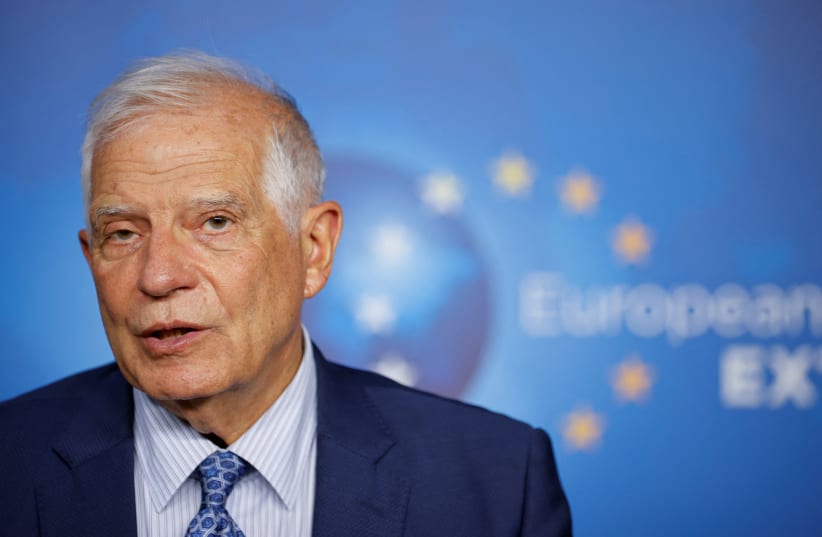
A four-day truce is an important first step in the Israel-Hamas conflict, but much more is needed to find a way out of the crisis, EU foreign affairs chief Josep Borrell said on Monday.
He was participating in the Forum for the Union of the Mediterranean in Barcelona.
Other nations that participated in the forum included Jordan and Spain, the nation hosting the event.
Nations state belief in Palestinian self-determination
The Palestinian Authority is the only possible and credible partner to seek peace in the Middle East, Spanish Foreign Ministry Jose Manuel Albares said on Monday.
He was hosting the Forum for the Union of the Mediterranean in Barcelona.
Jordan Foreign Minister Ayman Safadi also commenting, adding on Monday that the work for a two-state solution must begin with "ensuring an end to this brutal aggression."
Safadi was a participant in the forum.
Go to the full article >>Hamas is at war with the Middle East, German president says in Israel
Frank Walter Steinmeier added that on a personal level, he has a deep connection with Israel, but never more so than since October 7.
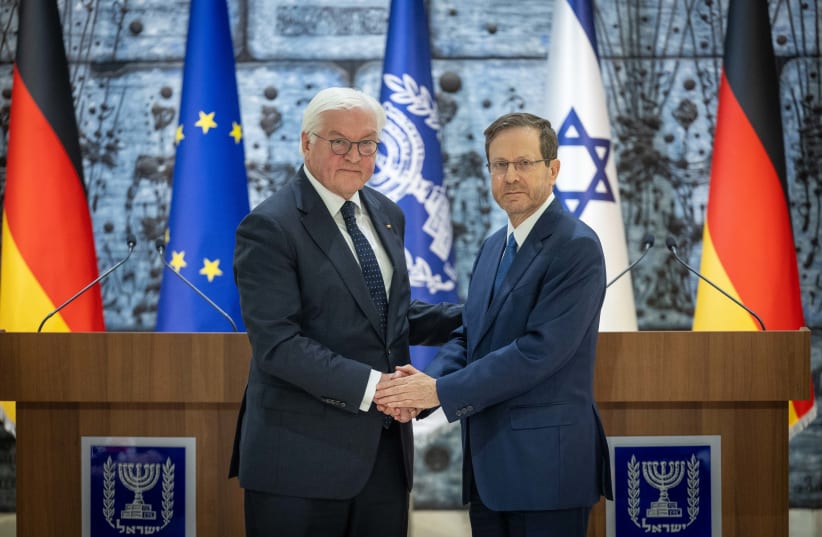
In the course of a solidarity visit to Israel on Sunday, Frank Walter Steinmeier, president of the Federal Republic of Germany, warned that Hamas is not only engaged in a war against Israel, but is beginning a war against the whole region.
Steinmeier, based on his past record, is one of the best friends that Israel has in Europe. He said that Germany will never forget the barbaric events of October 7, a day in which more Israelis than ever before were killed.
Germany wants to be in solidarity with Israel not only in times of trouble, when there are victims, declared Steinmeier, but 100% of the time.
He added that on a personal level, he has a deep connection with Israel, but never more so than since October 7.
Go to the full article >>Israel-Hamas War: What to know?
- Hamas launched a massive attack on October 7, with thousands of terrorists infiltrating from the Gaza border and taking some 240 hostages into Gaza
- Over 1,200 Israelis and foreign nationals were murdered, including over 350 in the Re'im music festival and hundreds of Israeli civilians across Gaza border communities